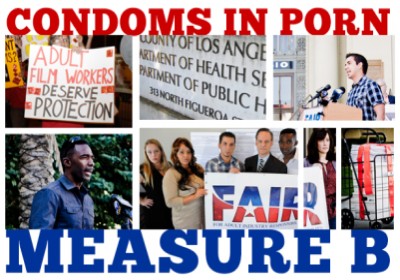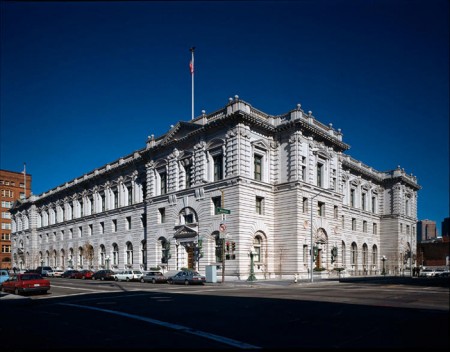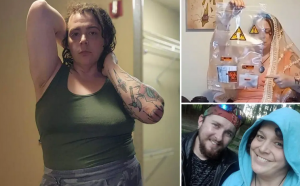We’re running through the Ninth Circuit’s opinion on the Measure B appeal, and will have a detailed analysis later on. Here is the gist of it…
Measure B a.k.a. the “County of Los Angeles Safer Sex In the Adult Film Industry Act”, is the ballot measure passed in 2012 that mandates the use of condoms in all vaginal and anal sex scenes in adult productions filmed in in Los Angeles County. The law was written and promoted by AIDS Healthcare Foundation, as the centerpiece of its years-long campaign against the adult film business.
Vivid Entertainment, and performers Kayden Kross and Logan Pierce, filed suit to overturn the law in January 2013, claiming that it impermissibly restrained free expression protected by the First Amendment.
At the District Court level, the court granted partial preliminary injunctive relief to the plaintiffs. Some sections of Measure B were invalidated and “severed” from the law, however the court refused to strike it down in its entirety or enjoin its enforcement.
In its appeal to the Ninth U.S. Circuit Court of Appeals, Vivid et al claimed that the district court had abused its discretion by, in effect, substantially re-writing the law.
Monday, the Ninth Circuit declined to issue an injunction to stop Measure B, ruling that
the district court did not abuse its discretion in holding that the invalid portions of Measure B (allowing for modification, suspension, and revocation of permits; authorizing administrative searches; and allowing discretion in setting fees) were severable.
Applying “intermediate scrutiny” to the First Amendment repercussions of the law, the Ninth Circuit also held that
the district court did not abuse its discretion in declining to enjoin the enforcement of Measure B’s condom mandate. The panel concluded that the condom mandate survived intermediate scrutiny because it was only a de minimis effect on expression, was narrowly tailored to achieve the substantial governmental interest of reducing the rate of sexually transmitted infections, and left open adequate alternative means of expression.
Perhaps it is worthwhile to note that the Ninth Circuit has long held the reputation of being the federal court of appeal with the highest reversal rate by the U.S.Supreme Court.
As Mark Kernes notes over at AVN, the court’s opinion “appears to stand the whole concept of legal ‘standing’ on its head”:
After acknowledging that “The Supreme Court has held that a party must have Article III standing both to initiate an action and to seek review on appeal,” the Ninth Circuit claims that it nonetheless has jurisdiction over the case because the plaintiffs—Vivid Entertainment, Kayden Kross and Logan Pierce—”alone who have invoked the federal courts’ jurisdiction.”
“For that reason, we need not and do not decide whether Intervenors satisfy the requirements of Article III standing,” the opinion continues. “To the extent that Plaintiffs contend that the district court erred in granting intervention, we cannot consider their challenge. An order allowing intervention under Federal Rule of Civil Procedure 24(a) is not a final order and is not an interlocutory order appealable by statute, so an appeal on that issue is premature until entry of final judgment.”
The proper term for such a ruling is “Catch 22,” from Joseph Heller’s novel of the same name. In making its decision, the Ninth Circuit is saying that despite the fact that Judge Pregerson unconstitutionally permitted AIDS Healthcare Foundation (AHF) to intervene in the case, it is unable to consider that issue until after a trial has taken place and Judge Pregerson issues his decision on the matter—but that ignores the fact that since Los Angeles County has steadfastly refused to take part in the lawsuit, no such trial would take place were it not for the unconstitutional actions of the judge in allowing AHF to intervene, to file motions and argue them in his court! The Ninth Circuit ruling also sets the stage for yet another motion which the Plaintiffs could file, which would move to preclude AHF attorneys from taking part in the trial since, under the U.S. Supreme Court’s opinion in Hollingsworth v. Perry, they had no standing to intervene in the first place.
TRPWL has also reached out to the parties and counsel for comment.
The Ninth Circuit opinion may be found here.
Comments from Free Speech Coalition CEO Diane Duke may be found here.







Sounds like the judges had already made up their minds before hearing the case, as their finding seems to completely ignore the plaintiffs’ central argument. Evidently they also consider themselves film critics: “a de minimis effect on expression, was narrowly tailored to achieve the substantial governmental interest of reducing the rate of sexually transmitted infections, and left open adequate alternative means of expression.” Yeah, right, sure. Measure B supporters never established that it would reduce the rate of sexually transmitted diseases and I’d like to know just why the possibility of “adequate alternative means of expression” is an excuse to… Read more »
Good article on the 9th Circuit…
http://www.nationalreview.com/bench-memos/394285/ninth-circuit-bad-start-supreme-court-term-again-jonathan-keim
[…] Duke, CEO of Free Speech Coalition, has issued the following statement on the Ninth Circuit’s decision in Vivid Entertainment’s appeal of the Measure […]